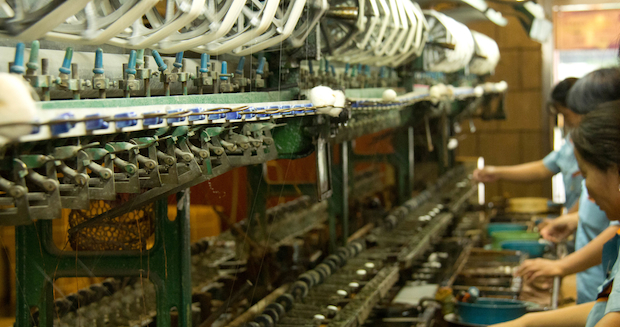To enforce new rules from the government and U.S. companies, a new breed of worker is appearing in China: A consultant who helps factories adhere to standards, without causing outrageous costs.

China, the world's biggest emitter of carbon dioxide, is coming to grips with a serious pollution problem, much of which is a fallout of its rapid growth as a manufacturing center. After years of growth and increasing pollution, the government began acting to reverse the trend, and set targets like this five-year plan announced in March, with goals to cut down on carbon dioxide emissions, clean up heavy industry, and improve air and water quality.
In addition, companies like Walmart and GE have begun to respond to international pressure to keep their supply chain healthy and clean, instead of taking advantage of China's lax environmental and labor rules. But actually implementing the practices set down by the government and big retailer--from interpreting the guidelines to be met, to implementing without incurring too high a cost--is tricky. To help, a program in China is training sustainable minded hall monitors, who work with factories to find ways to keep their businesses in compliance without busting the bottom line.
Yang Yu is one of these new breed of eco-cops, working at a factory called Fortune Electric in China. Fortune makes transformers and supplies them to international companies like GE as well as Chinese companies closer home. In two years, he's helped bring Fortune's carbon emissions down 19%, from 752 tons to 610 tons, made the company more energy efficient, and decreased the time that its workers took off because they were injured.
Yu is a graduate of the Environment, Health and Safety Academy in the Guangdong province in China. It's headed up by Vermont-based Institute for Sustainable Communities, which partnered with Guangdong's Sun Yat-sen University to build a course syllabus based on the standards in place at Walmart, GE, Adidas, Honeywell and other companies that have supply partners in China.
Matthew DeGroot, ISC's senior program officer, tells Fast Company that the idea for the ISC EHS Academy was born when they held a conference of multinational companies to see how their suppliers were responding to company and government-suggested environmental, health and safety standards.
Audits revealed that some suppliers caught on and made the changes to keep up with the stipulations. But, the vast majority tried to find a way around them. "When we asked companies what made the difference, they all said the same thing," DeGroot said. It came down to a star EHS trainee. "There's a champion in the factory who gets it, who understands not just the technical aspects but also has the management ability to see how EHS fits into the businesses plan," that person "really knew how to engage everyone from CEO to floor worker with that skill set."
At the time, China was running low on managers who had the know-how to keep up with Walmart and Co.'s demands, while keeping costs manageable for their bosses. International consulting firms offered courses that trained people for that, but they were expensive.
So ISC found their place in this "middle market." Supported by the local and national government health and environmental ministries and funded by the U.S. companies setting the standards, the consortium set up the Environment, Health and Safety Academy at Lingnan College at Sun Yat-sen University in Guangdong, "China's factory to the world." "Our mission is to dramatically increase the pool of EHS talent in China," DeGroot explained.
Adam Lin is another graduate of the program, who is taking modular courses at EHS while carrying on his work as a sustainability consultant and manager for a number of suppliers who manufacture sports equipment and clothing for multinational companies. Lin took courses at ISC's EHS Academy sponsored by his company in 2009. He found it so useful, he plans to go back and take a few more courses, he tells Fast Company, this time on his own dime.
He says the course gave him a better idea of how to monitor and manage safety issues in the supply companies he oversaw. He better understood the government's guidelines and requirements about environmental practices, and learned how to work with the factory to implement changes. He's also got a deeper understanding of his job assessing and responding to injuries and emergencies on the factory floor. He got to know other EHS managers, and how they were dealing with issues of environmental sustainability and safety in the Chinese factories they interacted with, and it gave him the confidence to do his job better.
In the two years since the Academy launched, they're beginning to see results. They've trained 3,000 factory managers, and officially certified 500. Graduates like Lin and Yu have gone on to implement changes at the companies they work at, and more and more companies are beginning to see how they can conserve power and cut costs.
As a mark of a job well done, the course is gaining more support from the Chinese government and is on the way to be certified at a local and national level. The Guangdong Bureau of Labor and Social Security recognizes the program and is developing a provincial certification protocol for the Guangdong academy. A full 90% of the trainees rate their experience as "very good."
In April, ISC signed a commitment with the Clinton Global Initiative to "equip managers of factories all across China with the advanced skills they need to boost EHS compliance, rein in energy use, convert to cleaner energy, and achieve significant reductions in greenhouse gas emissions," and keep up their work in China well into 2012. ISC is also looking at expanding its reach to other places. They're looking at India next, and planning a collaboration with Pune and Nagpur--the manufacturing hubs for companies and businesses in nearby Mumbai.
